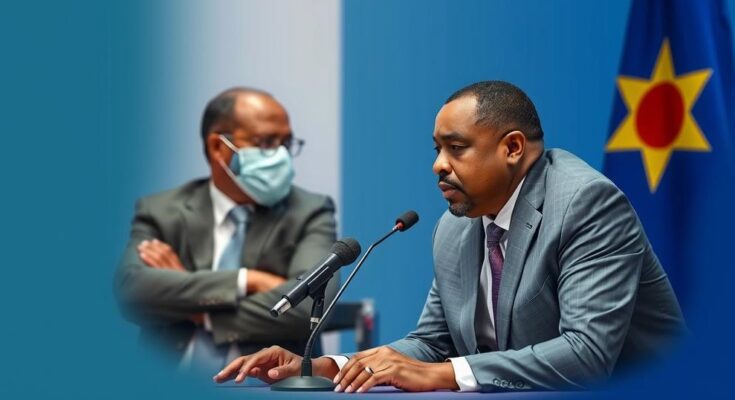The Democratic Republic of Congo’s (DRC) lack of political will jeopardizes the peace process agreed upon with Rwanda, despite recent advancements in the Luanda Process. Concerns were expressed regarding DRC’s militarization of Eastern DRC, ongoing attacks, and inflammatory rhetoric from officials, undermining trust and cooperation. Rwanda urges a genuine commitment from DRC to fulfill peace accord obligations for stability in the region.
The Democratic Republic of Congo’s (DRC) apparent lack of political will and good faith poses a significant risk to the recent advancements made in the Luanda Process, aimed at fostering peace in Eastern DRC and the Great Lakes Region. Despite a groundbreaking agreement signed between Rwanda and the DRC in Angola, concerns have emerged regarding DRC’s commitment to uphold this agreement. Rwanda’s Foreign Affairs Minister, Amb. Olivier Nduhungirehe, has highlighted ongoing issues such as military escalations and inflammatory rhetoric from DRC officials, which contradict the spirit of cooperation necessary for peace.
A recent virtual meeting between Rwandan Foreign Affairs Minister Amb. Nduhungirehe and DRC’s Thérèse Kayikwamba Wagner further illustrated these tensions. The meeting followed the adoption of the Concept of Operations (CONOPS) in Luanda, aimed at harmonizing peace efforts. Observers commended this as a vital step towards resolving decades of conflict affecting Eastern DRC. However, Rwanda’s commitment to the process has been undermined by fears that DRC is not taking the necessary actions to fulfill its obligations.
Minister Nduhungirehe detailed specific concerns regarding DRC’s militarization of Eastern DRC and subsequent attacks on M23 positions, which run counter to the ceasefire agreements in place. He referenced the DRC’s military activity, stating that it represents a failure in honoring commitments made under the peace process. Additionally, inflammatory statements made by high-ranking DRC officials, including a noted incident where the DRC Justice Minister incited inmates to turn against Rwandans, were cited as exacerbating the current climate of distrust.
Despite the ongoing rhetoric, Rwanda expressed hopes of continuing dialogue to address outstanding issues, particularly regarding the M23 group. The commitment to peace remains strong on Rwanda’s part, as highlighted during recent discussions under the facilitation of Angola. Amb. Nduhungirehe emphasized the need to tackle the root issues behind ongoing conflicts to find lasting solutions, underscoring the critical nature of cooperation between the two nations for regional stability.
Rwanda’s Government Spokesperson, Yolande Makolo, reiterated that due to the persistent hostile rhetoric, Rwanda will maintain its security measures to protect its national interests. The emphasis on security indicates that achieving a collaborative framework for peace will require significant adjustments on both sides to away from militarized posturing to genuine political dialogue.
The DRC has faced long-standing conflicts, particularly in its eastern regions, which are compounded by the involvement of various militia groups and external pressures from neighboring countries. The Luanda Process, facilitated by Angola, represents a diplomatic effort to restore peace and stability in this volatile area. The agreement reached between Rwanda and DRC is crucial in addressing the security concerns affecting the Great Lakes Region. However, mutual trust and good faith between the parties remain essential for the realization of any diplomatic resolution. Furthermore, the political context in the DRC, including ongoing military operations and incendiary statements from government leaders, complicates efforts towards peace. Regional observers emphasize the importance of addressing the root causes of conflict to ensure a sustainable peace agreement while minimizing hostilities. A bridged relationship between Rwanda and the DRC is vital for the stability of the entire region, necessitating a commitment to dialogue and reconciliation from both nations.
In conclusion, the peace process between Rwanda and the Democratic Republic of Congo faces significant challenges due to the latter’s lack of political will and good faith in implementing agreed measures. The ongoing militarization and aggressive rhetoric from DRC officials threaten to derail progress made in the Luanda Process. To achieve true stability in the Great Lakes Region, it is imperative for both countries to engage in earnest dialogue, adhering to the principles of cooperation and mutual respect. Continued diplomatic efforts and clear communication will be crucial in addressing the security issues that plague Eastern DRC.
Original Source: www.ktpress.rw




